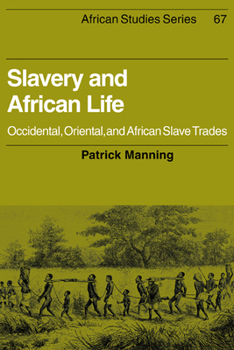Slavery and African Life: Occidental, Oriental, and African Slave Trades
Select Format
Select Condition 
Book Overview
This interpretation of the impact of slavery on African life emphasizes the importance of external demand for slaves by Occidental and Oriental purchasers in developing an active trade in slaves within Africa. The book summarizes a wide range of recent literature on slavery for all of tropical Africa. It analyzes the demography, economics, social structure and ideology of slavery in Africa from the beginning of large-scale slave exports in the seventeenth century to the gradual elimination of slavery in the twentieth century. While primarily a general survey, Dr. Manning presents original research and analysis, especially in his demographic model, computer simulation of slave trade and analysis of slave prices. By revealing clearly the succession of transformations which slavery brought throughout the African continent, the book shows in new depth the place of Africa in the history of the Atlantic basin, of western Asia and North Africa, and of the Indian Ocean.
Format:Paperback
Language:English
ISBN:0521348676
ISBN13:9780521348676
Release Date:September 1990
Publisher:Cambridge University Press
Length:252 Pages
Weight:0.95 lbs.
Dimensions:0.7" x 6.0" x 8.9"
Customer Reviews
3 ratings
Good reading
Published by Thriftbooks.com User , 19 years ago
I'm not a historian or history major, but I found this book to be a good introduction, and yet more valuable than just an introduction. (I kept this kind of vague to avoid spoiling it) Manning explained the economics of slavery's from its beginning and why it contributed to its end (abolitionist too). He wasn't lieing to the readers by portraying all Africans as all naiive victims... Manning clearly points out how slavery decimated Africa economically and helped create an African identity.
Slavery's Impact on Africa
Published by Thriftbooks.com User , 25 years ago
Have you ever wondered about the impact of slavery on Africa or how slavery contributed to the making of our contemporary world? Or have you ever thought about how the world should come to terms with the legacy of African enslavement? Then Pat Manning's text is a good place to start. The text graphically shows the varying demographic impact of enslavement on different regions and peoples of the continent. It illustrates how the forced emigration of Africans adversely affected economies, politics, societies and cultures in different parts of Africa. Manning forceful restates Eric Williams' contention that slavery did lead to the development of capitalism - within the context of the larger Atlantic economy rather than the narrow Caribbean economy. For me, Manning is at his best when he discusses how the victims and beneficiaries of African enslavement can come to terms with the legacy of that tragedy. The main criticism of the text is the excessive (and sometimes redundant) quantative simulations and graphs that it contains. Nonetheless, it is a good starting point for students, scholars and general readers interested in the subject of slavery in Africa.
Insightful yet boring
Published by Thriftbooks.com User , 26 years ago
This book is insightful and is based on evidence, but unlike most history novels it contains many diagrams, maps and graphs that complicate Manning's thesis, rather than clarifying it. The book is repetitive and dry while at the same time introducing new ideas. This book taught me about African culture and the economics behind the worldwide African slave trade, but it did so in an impersonal manner; it was general, not leaning on specific cases.






